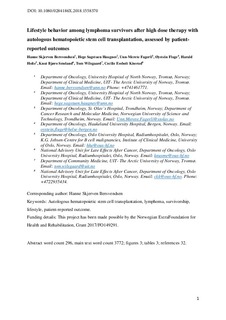| dc.contributor.author | Bersvendsen, Hanne Skjerven | |
| dc.contributor.author | Haugnes, Hege Sagstuen | |
| dc.contributor.author | Fagerli, Unn-Merete | |
| dc.contributor.author | Fluge, Øystein | |
| dc.contributor.author | Holte, Harald | |
| dc.contributor.author | Smeland, Knut Bjøro | |
| dc.contributor.author | Wilsgaard, Tom | |
| dc.contributor.author | Kiserud, Cecilie E. | |
| dc.date.accessioned | 2020-02-19T07:43:56Z | |
| dc.date.available | 2020-02-19T07:43:56Z | |
| dc.date.created | 2019-04-12T16:41:45Z | |
| dc.date.issued | 2019 | |
| dc.identifier.citation | Acta Oncologica. 2019, 58 (5), 690-699. | nb_NO |
| dc.identifier.issn | 0284-186X | |
| dc.identifier.uri | http://hdl.handle.net/11250/2642434 | |
| dc.description.abstract | Introduction: High-dose therapy with autologous stem cell transplantation (HD-ASCT) is associated with an increased risk of late effects. Our aim was to assess lifestyle behavior and factors associated with unhealthy lifestyle among HD-ASCT-treated lymphoma survivors (HD-ASCT-LS).
Materials and methods: We conducted a national cross-sectional study of HD-ASCT-LS treated during 1987–2008. Among 399 eligible participants, 312 (78%) completed patient-reported outcome measures (PROMs) on lifestyle behavior (physical activity, overweight, smoking and alcohol consumption), chronic fatigue (CF) and somatic and mental illness. We assessed lifestyle according to WHO recommendations. Multivariable logistic regression models were used to study associations between variables. A comparison to the general population was performed.
Results: Mean age at survey was 54.6 years, 60% were men, 55% sedentary, 55% overweight, 18% smokers and 5% had unhealthy alcohol consumption. Being sedentary was positively associated with older age, low household income, CF and higher somatic burden (≥4 self-reported somatic conditions). Overweight was positively associated with male gender and negatively associated with increased number of chemotherapy regimens prior to HD-ASCT. Current smoking was positively associated with living alone and CF, and negatively associated with older age. Male gender, CF and higher somatic burden increased the risk of an unhealthier lifestyle whereas the increased number of chemotherapy regimens prior to HD-ASCT decreased the risk. HD-ASCT-LS were significantly less sedentary, less overweight, and had a lower likelihood of smoking than the controls.
Discussion: Assessed by PROMs, unhealthy habits were frequent among HD-ASCT-LS and associated with comorbidity. Nevertheless, compared with controls significantly more HD-ASCT-LS met lifestyle recommendations. These results indicate that the HD-ASCT-LS may consist of two groups, the adhering group with less comorbidity and the non-adhering group with more comorbidity. Our findings illustrate the necessity of recommendations and support for improving health-related behavior in cancer survivorship plans in order to empower survivors in their life beyond cancer. | nb_NO |
| dc.language.iso | eng | nb_NO |
| dc.publisher | Taylor & Francis | nb_NO |
| dc.title | Lifestyle behavior among lymphoma survivors after high-dose therapy with autologous hematopoietic stem cell transplantation, assessed by patient-reported outcomes | nb_NO |
| dc.type | Journal article | nb_NO |
| dc.type | Peer reviewed | nb_NO |
| dc.description.version | acceptedVersion | nb_NO |
| dc.source.pagenumber | 690-699 | nb_NO |
| dc.source.volume | 58 | nb_NO |
| dc.source.journal | Acta Oncologica | nb_NO |
| dc.source.issue | 5 | nb_NO |
| dc.identifier.doi | 10.1080/0284186X.2018.1558370 | |
| dc.identifier.cristin | 1692046 | |
| dc.relation.project | ExtraStiftelsen: 2017/FO149291 | nb_NO |
| dc.description.localcode | Locked until 30 January 2020 due to copyright restrictions. This is an Accepted Manuscript of an article published by Taylor & Francis in Acta Oncologica on 30 January 2019, available at https://doi.org/10.1080/0284186X.2018.1558370. | nb_NO |
| cristin.unitcode | 194,65,15,0 | |
| cristin.unitcode | 1920,12,0,0 | |
| cristin.unitname | Institutt for klinisk og molekylær medisin | |
| cristin.unitname | Kreftklinikken | |
| cristin.ispublished | true | |
| cristin.fulltext | postprint | |
| cristin.qualitycode | 1 | |
